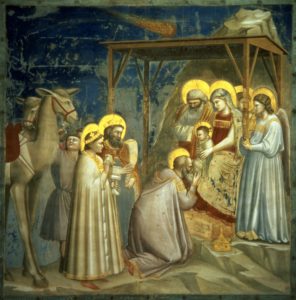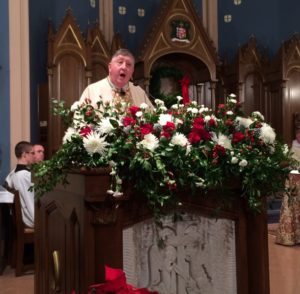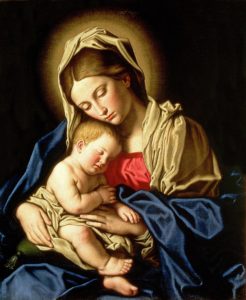December 24, 2016
In Christmas homily, bishop asks faithful to bring God’s love to one another
REGIONAL
Staff report

The adoration of the Magi is depicted in a 14th-century painting by Giotto di Bondone. The feast of the Nativity of Christ, a holy day of obligation, is celebrated Dec. 25. (CNS/Bridgeman Images)
SPRINGFIELD – In his homily at the 4 p.m. Christmas Eve liturgy at St. Michael’s Cathedral, Springfield Bishop Mitchell T. Rozanski recalled the scene of Christ’s birth and the closeness of God to all humanity. The complete text of his homily follows:
“Today is born our Savior, Christ the Lord!”
We have sung this refrain response to a beautiful Psalm of Praise, extolling the wonders of God in creation. Today, though, we sing Psalm 96 in response to God’s re-creation of heaven and earth as his only begotten son is born into our world. God has left the comfort of the heavens to immerse himself in our world that is not so orderly, harmonious and, indeed, perfect as the heaven from which he reigns.

Springfield Bishop Mitchell T. Rozanski delivers his Christmas homily during the Christmas Eve liturgy at St. Michael’s Cathedral, Dec. 24, 2016.(Photo by Sean Manning)
Yet, God did enter our creation, showing a love for us that knows no boundaries. After numerous prophets had been sent to call God’s people back to living in covenant with him, God himself entered our world to illustrate his love for us, his creation.
And God comes to us not with overwhelming power, but as the baby born at Bethlehem. What can be more vulnerable than a child born in a manger, far from not only the physical home of his parents, but far from the heaven which he himself created?
And what can be more inviting to us than the message to shepherds in the fields from the angels, praising God that finally, heaven has pierced the bounds of earth? This is the reason why we can sing with joy Psalm 96, our Christmas carols and our songs of praise to God. For Isaiah the prophet tells us: “For a child is born to us, a son is given us; upon his shoulder dominion rests.”
Christmas is ultimately that time when God willed to become one with us, his people. He broke the boundaries of the heavens to dwell with us and to show us the way to himself. Just as God’s love would not hold back anything in bringing creation into being, so his love would not hold back his very presence to birth us to be re-created, redeemed and raised up in his very son. Indeed, God has come to us so that we can dwell with God.
This is the essence of the Christmas story and our celebration of this very holy time. God
himself took the initiative to reach out to us, to embrace our humanity, our struggles, joys and hopes so that we can know of our oneness with him.
Whenever I approach the manger scene to be reminded of that first Christmas, I am always amazed at the peace and serenity that is portrayed. Mary and Joseph, beaming at the birth of Jesus, adoringly look upon the child. The shepherds, summoned by the angels, doff their head coverings and bow low when they enter the manger. Clearly and brightly, the stars shine emphasizing the nearness of heaven to earth.

Mary and the Christ Child are depicted in this 17th-century painting by Giovanni Battista Salvi.(CNS/Bridgeman Images)
And yet, we know that this scene was far from ideal. There was no decent place to welcome this child, his parents were forced on a journey because of the emperor and he was to be born in a shelter for the animals. God has come into our world, has left the security of heavenly home to bring to us the security and peace of his love. God has reached out to us in love to show us the way we can reach out to others in love. This is the message we must take away with us as we behold the manger scene.
Christmas is the story of light and hope because God has come to us. And we, in turn, who so benefit from God’s redemptive love, are called to reach out to others. It is love that is expressed not so much in the gifts that we receive and give, but in the presence that we give to one another in our love and concern.
Jesus was born into our world so that we can be born into eternity by teaching us that the way to his kingdom is the way of love. From the manger in Bethlehem, to the call of his first disciples, to the encounter with the woman at the well and the lepers on the way, Jesus teaches us the encounter of love.
If we truly believe the message we celebrate this day, then our lives must be dedicated to the love that has been so generously shown to us. And love naturally turns us to look outside of ourselves, for the good of the other.
God’s ultimate expression of love was to be born into our world, despite its pain, imperfections, sinfulness and war. God did not put himself above our human darkness, but brought his light to it in Jesus. In following the example of Jesus’ love, we too are called to bring his light to the darkness of our world. Only the light of love can overcome the darkness of hatred and division. And only the courage to love can break down the walls that divide us from one another.
As you look upon the manger scene today, I invite you to witness the God who pierced our imperfect world with his perfect love. I invite you to be the message of Christmas to one another, piercing the loneliness and pain of others with the love that God has so generously put into your hearts.
May we who gather here to celebrate this wondrous gift truly sing with our very lives: “Today is born our Savior, Christ the Lord!”
The Dec. 24 liturgy at the cathedral will be broadcast in its entirety on Christmas morning at 10 a.m. on WWLP-22NEWS.


 Facebook
Facebook Youtube
Youtube
